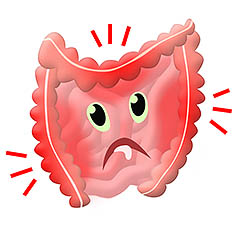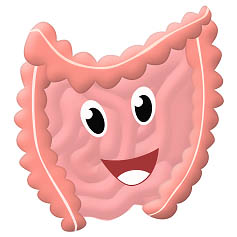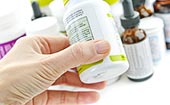 What you eat has a dramatic effect on your health and your ability to heal from infections. In fact, a person’s diet is usually the key to overcoming a chronic cycle of recurring infections. But the importance of your diet is usually overlooked or even dismissed your doctor and the mainstream medical system.
What you eat has a dramatic effect on your health and your ability to heal from infections. In fact, a person’s diet is usually the key to overcoming a chronic cycle of recurring infections. But the importance of your diet is usually overlooked or even dismissed your doctor and the mainstream medical system.
Consider how your car works. By design, your car only works if the right kind of fuel is used. What happens if you put diesel fuel into an unleaded car? At best, it will belch black smoke and lurch down the road making weird noises. And what would happen if you put water or sugar into your gas tank? You’d be lucky if your car even started, and the damage done to your engine would be difficult and expensive or even impossible to fix.
The car example above is how your body works too. Some foods are recognized by your body and they help keep your systems running properly. But other foods and ingredients stress and inflame your body, inflame your GI system, feed infections and weaken your immune system. The trouble is, there’s a lot of conflicting information about what a healthy diet looks like. And C. diff. infections present special challenges when it comes to what foods you can tolerate.
C. diff. Food Challenges
With foods and C. difficile, every infection and every person can be a little different. Some people will find that some foods can be a serious challenge, causing their infection symptoms to worsen. In contrast, other people can eat pretty much whatever they choose with no problems. But most people with C. diff. must avoid certain “problem” foods that make their symptoms worse.
An immune boosting diet may help you recover from an infection and make you more resistant to future infections. However, you may need to wait until your infection clears to start such a diet. But if well tolerated, an immune-boosting diet that’s low in sugar and low in processed foods may help you recover faster from C. difficile.
You may have to strike a delicate balance between foods that support your immune system, problem foods that you cannot tolerate, and foods that help you prevent unhealthy weight loss. So be prepared to use a little trial and error for the foods and diets discussed below, to find out what works best for your unique needs.
Common Problem Foods
 The most common “problem” foods include:
The most common “problem” foods include:
- Sugar and sweets, desserts
- Dairy products
- Hot or spicy foods
- Carrageenan containing foods (common in milk alternative products)
- Raw veggies
- Red meats
- Fatty foods
- Caffeinated beverages
Another set of foods that are best avoided when possible because they are very inflammatory to the gut are “seed oils”. These oils include canola, soy, sunflower, corn, vegetable, etc. Coconut or olive oil would make better plant oil choices, if tolerated.
You may tolerate some of the these foods just fine, but many people have problems with some or all of them.
Some of the most common “OK” foods that people with C. difficile often tolerate well are included in the BRAT diet. BRAT stands for Bananas, Rice, Apple sauce and Toast. The downside is that BRAT is high in carbs and sugar, provides incomplete nutrition and doesn’t provide protein. And there’s no guarantee that BRAT will work for you or be tolerated, but it may be worth a try.
Most people have to use a trial and error approach to foods because different people can have different problem foods. So avoiding the above “problem foods” is a good starting point, but it can take some time to work out which foods you can tolerate and which foods you cannot.
Specific Diets for Immune Support
Michelle’s C. diff. book includes details the benefits of a general purpose, immune-boosting diet, which basically avoids sugar and all processed foods and instead focuses on nutritious whole foods.

The purpose of an immune-boosting diet is to help you be healthier and happier and to provide support to your immune system so you can lead an infection-free life.
You may find that you cannot tolerate such a diet until your C. diff. infection clears. However, you may also find that eating some version of a low-carb, low sugar, whole-foods diet may help improve your C. diff symptoms.
An immune-supportive diet is similar to the well-known Paleo (whole foods) and Keto diets (high fat, whole foods). Michelle’s immune boosting diet is a great starting point, but for some people, cutting carbs to lower levels may be needed to see significant health and immune system benefits.
Everyone’s diet needs are a little bit different, and those needs can change over time. And C. difficile can make following any food plan very challenging or even impossible, at least until the infection clears.
From a high level view, everyone will benefit from eating less processed foods, less inflammatory foods and less sugar. Everyone will benefit from just eating whole, real foods that come from the farm to the table.
Whole Food Diets
There are six specific diets that are low sugar, and lower inflammatory diets that can support your body in healing from infections. As mentioned above, everyone can benefit from following one of these diets, but the “best” one varies from person to person, and the best one for you may change over time.
These six diets range from broad to narrow in the types of foods (vegetables, fruits, meats, oils, nuts, seeds, etc) that is customary with the diet. Of course, a book could be written about all the specifics of each of these, so I’m including a very brief summary.
All of these diets eliminate grains like wheat, corn, and rice as well as sugar. From the most broad to the most restricted, these diets are:
- Paleo: Vegetables, fruits, nuts, seeds, fish, and grass-produced meats.
- Low Carb: Higher protein and fat with vegetables, low in carbohydrates
- Ketogenic (Keto): Higher fat diet, mid-protein and low in carbohydrates
- Ketovore: A combination of keto and carnivore diets allowing for low carbohydrate foods
- Carnivore: Restrictive, ancestral eating. A zero carb diet reliant upon meat, seafood, eggs and dairy
- Lion Diet: The most restrictive. Simply beef, salt and water
As a general rule, if you are accustomed to a Standard American Diet (SAD), which is high in ultra-processed and inflammatory foods, inflammatory plant seed oils and sugar, then a whole foods Paleo diet will likely provide very positive results, especially if you have a stubborn infection. But as time passes, factors such as increased age, medications, chronic diseases, systemic inflammation, genetics and food intolerances may require a person to shift their diet to see enhanced health benefits. Again, every person is unique as to what is best for them.
Low Carb and Elimination Diets
 Recently Michelle has been researching into specific diets for eliminating long standing, low grade infections like UTI, leaky gut, IBS, IBD, gingivitis, Lyme, chronic H. pylori and others.
Recently Michelle has been researching into specific diets for eliminating long standing, low grade infections like UTI, leaky gut, IBS, IBD, gingivitis, Lyme, chronic H. pylori and others.
Most of these diets focus on nutrient dense foods and very low carbohydrates for a certain amount of time. A few C. diff sufferers have claimed that a low carb diet was needed to end their C. difficile infection. Sometimes called elimination diets, the idea is to give your body a rest and to give your immune system a boost by following a diet that’s very low in sugars, toxins and inflammatory foods.
Sugar (from alcohol, sugars, processed foods and grains) feed bacterial and fungal pathogens and sugars also correlate to insulin resistance, metabolic syndrome and non-alcoholic fatty liver disease, which are inflammatory conditions in the body.
After 3 months or so of an elimination diet, other foods can slowly be added back in to see which ones you tolerate, and with ones cause negative symptoms to return.
Michelle followed a low-carb Paleo diet for many years with good initial results, but later she found that she needed to change her diet to address several recurring symptoms. In particular, a low carb ketovore or even a strict carnivore diet at least short term, seems to lead to success where other interventions have failed.
There are many different thoughts and opinions from doctors about the benefits of long-term, low-carbohydrate diets like ketovore and carnivore diets. Some people appear to do very well on these diets for the long term. Other people find a short-term ketovore or carnivore diets to “reset” their body is best, then later adding in more whole foods and more carbohydrates.
Getting Started on a Keto Diet
Dr. Eric Berg has a very respected YouTube channel and he highly recommends Keto diets with very low carbs for dealing with infections in general (not specifically C. difficile). In regards to a Keto or low carb diet, Dr. Berg and many other doctors consider it one of the best diets to get healthy and stay healthy.
If you haven’t, I suggest subscribing to his youtube channel. Like us, Dr. Berg has also been censored by Big Tech for telling the truth when it comes to how to be healthy.
Below is a good video intro to the Keto diet:
https://youtu.be/dR6TnC1RY_8?si=b1O_07hoseB7y26I
And below is a good C. diff. treatment video by Dr. Berg, plus a link to his Keto diet videos:
https://youtu.be/4mio_jwXLFs?si=dGZb03jNzuLzmZRH
https://www.youtube.com/@Drberg/search?query=diet

About the Author – Michelle Moore, BSc
Michelle Moore is a microbiologist, holistic health educator, and author of C. difficile Treatments & Remedies. With over 10 years of experience in pharmaceutical research and over 20 years in natural medicine, she helps people overcome C. difficile and other chronic infections naturally.





 Fill in the form below to get our C. diff. tips newsletter and your free report “10 Things You Need to Know to Overcome C. difficile”.
We value your Privacy. Your email will be kept strictly confidential & secured. See our
Fill in the form below to get our C. diff. tips newsletter and your free report “10 Things You Need to Know to Overcome C. difficile”.
We value your Privacy. Your email will be kept strictly confidential & secured. See our 
